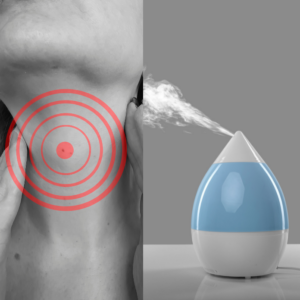Dr. Matthew Olesiak continues to make a significant impact in the medical field through his work at SANESolution and his dedication to evidence-based practices.
Understanding Throat Irritants
Picture this: You wake up one morning with a scratchy feeling in your throat. Every swallow feels like sandpaper, and talking becomes a chore.
Throat irritation is something we’ve all experienced, and it can be incredibly uncomfortable. Understanding throat irritants would spare you this experience.
But what causes this annoying sensation in throat irritants?
In this Throat Cleaner and throat health post, we’ll explore the common culprits behind throat irritants, such as viral infections, bacterial infections, allergies, and acid reflux, and discuss how to identify symptoms, diagnose the cause, and find the most effective treatment. If you want to understand even more about your throat’s health then check out our 5 Tips for What is Good for Lung Health and Nasal Irrigation for Throat: Benefits, Risks & Tips guides!

- New Report Says Your Brain Could Be the Key to Reducing Phlegm Over 50
- Doctor's "Leave The Throat Phlegm Behind" Tutorial Goes Viral With People Over 50
- Can You Relieve Throat Phlegm and Coughing In 60 Seconds A Day? This Doctor Says Yes
- How To Banish Phlegm When 50+ (Do This Every Day)
Short Summary
- Common throat irritants include viral infections, bacterial infections, allergies, and acid reflux.
- Identifying symptoms such as sore throat, swollen glands, and fever can help guide treatment plans.
- Strategies to reduce germs and allergens, as well as good hygiene are essential for preventing throat irritation.

Common Throat Irritants
Throat irritation, including a dry and painful throat, can be a real pain – literally. Understanding the common causes of this discomfort is essential in finding relief and preventing future occurrences. The usual suspects behind most sore throats include viral infections, bacterial infections, allergies, and acid reflux.
Each cause presents its own set of symptoms and requires a different approach to treatment. Let’s delve deeper into each of these throat irritants and learn how they wreak havoc on our throats.
Viral Infections
Viruses are the most common cause of sore throats, with the common cold and flu being the main culprits behind a sore throat caused by viral infections. These infections tend to be more prevalent during the winter and autumn months when we spend more time indoors and in close proximity to others. As the viruses spread, our throats become breeding grounds for infection, leading to the all-too-familiar scratchy, painful sensation we know as viral sore throats.
While there is no cure for viral infections, home remedies like drinking warm liquids can help alleviate symptoms of a viral infection. Remember, antibiotics are not effective against viral infections, so it’s essential to let the illness run its course and focus on symptom relief.
Bacterial Infections
While less common than viral infections, bacterial infections can also cause sore throats. Streptococcus pyogenes (group A streptococcus) bacteria is a prime example of this. The symptoms of strep throat include sore throat, difficulty swallowing, inflamed and swollen tonsils, fever, headache, skin rash, and flu-like symptoms.
Strep throat requires antibiotic treatment to prevent complications such as rheumatic fever. If you suspect you have strep throat, contact your healthcare provider for a proper diagnosis and treatment plan.

Allergies
Allergies can be a major source of throat discomfort. Symptoms may vary greatly in intensity from person to person. Allergens like pollen, dust, pet dander, and certain foods can trigger an immune response, leading to symptoms such as throat irritation, nasal congestion, and coughing. The duration of throat irritation caused by allergies depends on the length of exposure to the allergen.
To minimize allergy-related throat irritation, it’s crucial to identify and avoid the allergens causing the reaction. Reducing exposure to allergens can make a significant difference in your overall comfort and throat health.
Acid Reflux
Acid reflux, a condition in which stomach acid flows back into the esophagus, can also cause throat irritation and discomfort. This regurgitation of stomach acid irritates the sensitive lining of the esophagus, leading to feelings of scratchiness and pain in the throat.
While acid reflux is a common condition, affecting approximately 60 million Americans at least once a month, it’s essential to address the underlying causes and make appropriate lifestyle changes to minimize its impact on your throat and overall health.
Identifying Throat Irritant Symptoms
Recognizing the symptoms of throat irritants is crucial for determining the cause and seeking appropriate treatment. By paying close attention to sore throat symptoms, swollen glands, and additional symptoms like fever, cough, and nasal congestion, we can better understand the root cause of our throat irritation and take steps toward relief.
Let’s explore these symptoms and their significance in more detail.

Sore Throat Symptoms
The primary symptoms of a sore throat include throat pain or discomfort, difficulty swallowing, and a feeling of scratchiness in the throat. These symptoms can be caused by a variety of factors, including viral and bacterial infections, allergies, and other upper respiratory tract illnesses. More serious causes of sore throat include tonsillitis, strep throat, and mononucleosis.
Paying attention to the severity and duration of these symptoms can help determine whether the cause is a simple cold or something more serious. For instance, a sore throat that persists for more than two weeks may warrant medical attention.
When experiencing a sore throat, it’s essential to monitor your symptoms and seek medical advice if necessary. Early diagnosis and treatment can help prevent complications and promote a quicker recovery.
Swollen Glands
Swollen glands, also known as swollen lymph nodes, can be a telling sign of infection or inflammation in the throat. These enlarged lymph nodes are the body’s way of fighting off infection or illness. The most common cause of swollen lymph nodes is an upper respiratory infection, but other factors such as infections, an abscessed or impacted tooth, ear infection, colds, flu, gingivitis, mononucleosis, and tonsillitis can also contribute.
Monitoring the presence and severity of swollen glands can help guide appropriate treatment and care.
Additional Symptoms
Aside from the primary symptoms of a sore throat and swollen glands, additional symptoms can help pinpoint the cause of throat irritation. Fever, cough, and nasal congestion may accompany throat irritation caused by viral infections, while other symptoms like skin rash or difficulty breathing may indicate allergies or a more serious health issue.
Monitoring these additional symptoms and discussing them with your healthcare provider can help determine the most appropriate course of action, whether that includes further testing, medication, or lifestyle changes. Early diagnosis and treatment are essential for a speedy recovery and preventing complications.

Diagnosing Throat Irritants
To accurately diagnose the cause of throat irritation, healthcare providers may use a combination of methods, including a physical examination, throat culture, and additional diagnostic tests if necessary.
Let’s examine these diagnostic tools and their roles in identifying the underlying cause of throat irritation.
Physical Examination
A physical examination can help identify signs of infection or inflammation in the throat. During the exam, a healthcare provider will typically check the throat, tongue, and possibly the ears to assess the cause of the irritation.
This examination can provide valuable insight into potential causes and guide appropriate treatment.
Throat Culture
Throat culture tests play an essential role in diagnosing bacterial infections like strep throat. This test involves taking a sample of cells from the back of the throat, which is then cultured in a lab to identify any bacteria present.
A positive result for group A streptococcus bacteria indicates the presence of strep throat, which requires antibiotic treatment.
Additional Diagnostic Tests
In cases of more severe or persistent throat irritation, further diagnostic tests may be necessary. These tests may include imaging tests like X-rays or CT scans and blood tests to assess infection, inflammation, or other underlying health issues.
These additional tests can help identify the root cause of throat irritation and ensure the most effective treatment plan is put into place.

Treatment Options for Throat Irritants
Once the cause of throat irritation has been determined, an appropriate treatment plan can be implemented. Treatment options for throat irritants may include antibiotics for bacterial infections, over-the-counter medications for viral infections and allergies, and home remedies for temporary relief.
Let’s take a closer look at these treatment options and their effectiveness.
Antibiotics for Bacterial Infections
Antibiotics are prescribed for bacterial infections, such as strep throat, to prevent complications like rheumatic fever. Penicillin is typically prescribed as the course of treatment for strep throat.
It’s important to complete the full course of antibiotics, even if symptoms improve, to ensure the infection is properly treated and to minimize the risk of antibiotic resistance.
Over-the-Counter Medications
Over-the-counter medications can help alleviate symptoms of viral infections and allergies. Pain relievers, numbing medications, and decongestants are available over the counter and may be beneficial in reducing symptoms such as pain, inflammation, and congestion.
Home Remedies
Home remedies, like saltwater gargles and honey, can provide temporary relief for throat irritation. Other options include using a humidifier, drinking warm liquids, such as tea or water with honey, or using throat lozenges to soothe the throat.
While these remedies may not treat the underlying cause of throat irritation, they can provide comfort and relief from symptoms.
Preventing Throat Irritation
Preventing throat irritation involves adopting strategies to avoid germs, reducing allergen exposure, and maintaining good hygiene. By taking proactive steps to protect our throats from irritants, we can minimize the occurrence of sore throats and maintain our overall health.
Let’s explore these preventative measures in more detail.
Avoiding Germs
One of the most effective ways to prevent throat irritation is to avoid germs by washing hands frequently and avoiding close contact with sick individuals. By practicing good hygiene, we can reduce the risk of coming into contact with the germs that cause throat irritation, helping to keep ourselves and our loved ones healthy.
Allergen Reduction
Reducing allergen exposure is another important strategy for preventing allergy-related throat irritation. Using air purifiers and cleaning regularly can help minimize allergens in our environment, such as pollen, dust, and pet dander.
By creating a cleaner, allergen-free space, we can reduce the likelihood of throat irritation caused by allergies.
Maintaining Good Hygiene
Maintaining good hygiene, including proper oral care and staying hydrated, can help keep the throat healthy and reduce the risk of irritation. Brushing teeth twice daily, flossing regularly, and drinking plenty of water can help maintain a healthy oral environment and minimize the risk of throat irritation.
Summary
In conclusion, understanding the common causes of throat irritation, such as viral infections, bacterial infections, allergies, and acid reflux, is essential in finding relief and preventing future occurrences. By identifying symptoms, seeking appropriate diagnosis and treatment, and adopting preventative measures, we can take control of our throat health and reduce the discomfort associated with throat irritation. Remember, a healthy throat is an essential part of our overall well-being, so don’t hesitate to seek medical advice if you’re experiencing persistent or severe throat irritation.
Frequently Asked Questions
How do you get rid of an irritated throat?
Soothe your irritated throat with hot tea with lemon, lozenges, hard candies, salt water gargling or ice chips, and a humidifier or vaporizer.
What could cause irritation in throat?
A sore throat can be caused by viral and bacterial infections, such as colds, the flu, strep throat, coxsackie virus, and mononucleosis. It can also be triggered by allergies, mouth breathing at night, smoking, pollution, and irritants in the air.
Why am I feeling irritated in my throat?
Your irritation in the throat may be caused by dryness, allergies, medications, or a recent cold.
Consider seeking medical advice to determine the root cause and treatment.
When should I be worried about throat irritation?
If your sore throat symptoms don’t improve within five days, or you have a fever over 101 degrees lasting more than one to two days, difficulty sleeping due to swollen tonsils/adenoids, or a red rash appears, it is time to see your doctor.
What is the most common cause of a sore throat?
The most common cause of a sore throat is a viral infection, such as a cold or the flu.

Dr. Matthew Olesiak continues to make a significant impact in the medical field through his work at SANESolution and his dedication to evidence-based practices.



